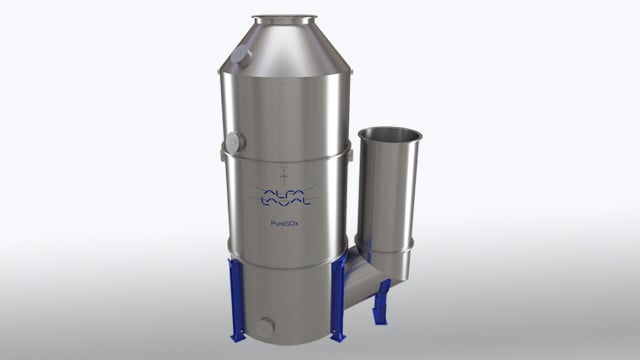Alfa Laval and NMRI have succeeded in onboard CO2 capture testing using an exhaust gas cleaning system
As the marine industry strives for a decarbonized future, Alfa Laval and partners are investigating the technologies needed to achieve it. One of the opportunities is carbon capture and storage (CCS), which took a step towards realization in recent testing performed by Alfa Laval and Japan’s National Maritime Research Institute (NMRI).
Testing CO2 capture at scale
Initiated by NMRI, the CO2 capture testing project was designed to provide real-world validation of results achieved in the lab. Since it required a proven, full-scale hybrid scrubber system, Alfa Laval PureSOx played an important role. The Japanese shipowner associated with the research, who had installed PureSOx for SOx compliance on a newbuild, arranged with Alfa Laval and the shipyard to include the testing in the vessel’s sea trials.
“Alfa Laval PureSOx is a proven solution with a long track record in SOx abatement,” says René Diks, Head of Exhaust Gas Cleaning Systems at Alfa Laval. “The positive results from our project with NMRI Japan show that scrubber technology could also play a role in removing carbon at sea.”
A stepping stone on the route to carbon neutrality
CCS is a potential bridge technology, offering the possibility to extract carbon from emissions until carbon-neutral fuels become more viable. In a full CCS solution, carbon removed from a vessel’s exhaust gas would be stored away to prevent it from ever entering the atmosphere. For this project, the scope was limited to showing that a scrubber could perform the CO2 capture on board. The modified PureSOx system was able to absorb CO2 from the auxiliary diesel engines in port, while operating in closed loop.
“Both short-term and long-term solutions will be needed to achieve IMO Greenhouse gas emission reduction targets,” says Diks. “Much development is needed before CCS can be deployed at sea, but this preliminary testing showed clear potential in the approach. Though designed to remove SOx, PureSOx demonstrated its ability to remove CO2 while operating in closed loop.”
Cooperative effort to fight climate change
The research with NMRI Japan is one of many Alfa Laval projects with sustainability in focus. Alfa Laval is a member of the Getting to Zero Coalition and a Strategic Corporate Partner in Maersk Mc‑Kinney Møller Center for Zero Carbon Shipping. In addition, there are numerous collaborations taking place at the Alfa Laval Test & Training Centre in Aalborg, Denmark.
“Decarbonizing the marine industry will demand a wide range of emission-reducing technologies in addition to new fuels,” says Diks. “The only way to achieve those leaps is to explore possibilities together, across the industry and around the world. We at Alfa Laval are proud to contribute with our expertise, technologies and development resources.”
Editor’s notes
This is Alfa Laval
Alfa Laval is active in the areas of Energy, Marine, and Food & Water, offering its expertise, products, and service to a wide range of industries in some 100 countries. The company is committed to optimizing processes, creating responsible growth, and driving progress – always going the extra mile to support customers in achieving their business goals and sustainability targets.
Alfa Laval’s innovative technologies are dedicated to purifying, refining, and reusing materials, promoting more responsible use of natural resources. They contribute to improved energy efficiency and heat recovery, better water treatment, and reduced emissions. Thereby, Alfa Laval is not only accelerating success for its customers, but also for people and the planet. Making the world better, every day. It’s all about Advancing better™.
Alfa Laval has 16,700 employees. Annual sales in 2020 were SEK 41.5 billion (approx. EUR 4 billion). The company is listed on Nasdaq OMX.

